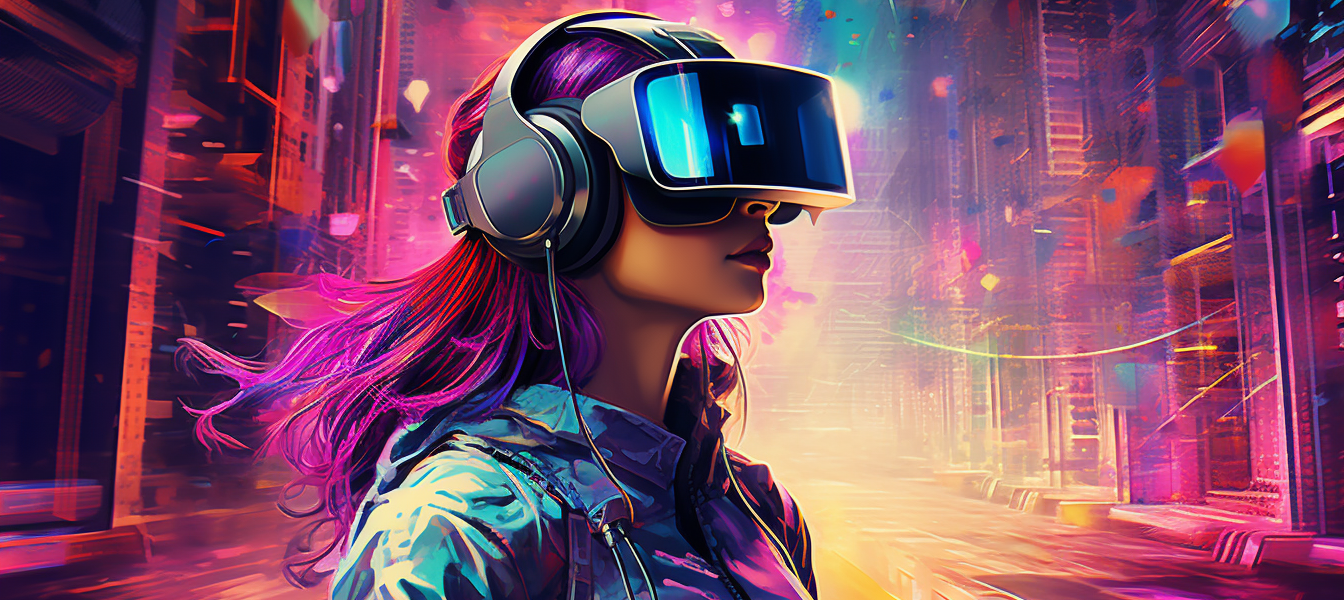The convergence of Artificial Intelligence (AI) and Virtual Reality (VR) technologies has ushered in a new era of immersive experiences, revolutionizing how we interact with digital environments. This article explores the synergistic potential of AI and VR in creating immersive worlds and reshaping industries across entertainment, education, healthcare, and beyond.
The Power of Virtual Reality (VR)
Virtual Reality (VR) has long captured the imagination of technologists and enthusiasts alike, offering unprecedented opportunities to transport users to alternate realities and immersive simulations. With Virtual Reality (VR) headsets becoming more accessible and affordable, the potential applications of this transformative technology are expanding rapidly. From immersive gaming experiences to virtual travel adventures and architectural simulations, VR has emerged as a powerful tool for storytelling, training, and exploration.
The Role of Artificial Intelligence
At the heart of VR’s evolution lies the integration of Artificial Intelligence, which adds layers of interactivity, realism, and adaptability to virtual environments. AI algorithms enable virtual entities to exhibit lifelike behaviors, respond dynamically to user inputs, and even anticipate user intentions. This fusion of AI and VR blurs the lines between reality and simulation, creating immersive worlds that feel increasingly indistinguishable from the real world.
Enhancing Immersion Through AI
AI-driven technologies such as natural language processing, computer vision, and machine learning are transforming the way users interact with virtual environments. Intelligent agents and NPCs (Non-Player Characters) powered by AI algorithms can engage users in meaningful conversations, simulate social interactions, and adapt their behaviors based on user feedback. This level of immersion fosters deeper emotional connections and enriches the overall VR experience, making virtual worlds feel more authentic and responsive to user actions.
Personalized Experiences
One of the most compelling aspects of AI-enabled VR is its ability to deliver personalized experiences tailored to individual preferences and characteristics. Through data analytics and user profiling, AI algorithms can curate content, recommend activities, and adapt gameplay mechanics to suit each user’s unique interests and skill levels. Whether it’s customizing learning modules in educational VR simulations or personalizing gameplay challenges in VR games, AI-driven personalization enhances user engagement and retention, paving the way for more immersive and impactful experiences.
Applications Across Industries
Beyond entertainment, the fusion of AI and VR is unlocking transformative possibilities across a wide range of industries. In healthcare, Virtual Reality (VR) simulations powered by AI are revolutionizing medical training, surgical procedures, and therapy sessions, providing healthcare professionals and patients with realistic and immersive learning environments. In education, AI-driven VR platforms are redefining classroom experiences, enabling interactive learning modules, virtual field trips, and collaborative projects that transcend geographical boundaries.
Challenges and Considerations
While the potential of AI and VR to create immersive worlds is undeniable, it also presents challenges related to privacy, ethics, and accessibility. As AI algorithms become more sophisticated, ensuring transparency, fairness, and user consent becomes paramount to building trust and mitigating potential risks. Additionally, addressing issues of accessibility and inclusivity is crucial to ensuring that immersive experiences are available to users of all abilities and backgrounds.

Conclusion
As AI and VR continue to evolve and converge, the boundaries between the physical and virtual worlds are becoming increasingly fluid. The synergy between these technologies is driving innovation, transforming industries, and unlocking new realms of human experience. By harnessing the power of AI to create immersive worlds, we are not only redefining the way we play, learn, and interact but also shaping the future of human-computer interaction in profound and exciting ways.




